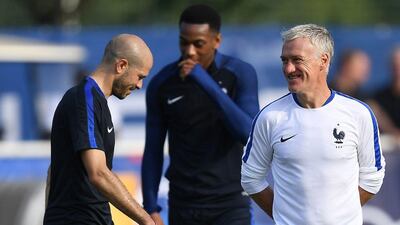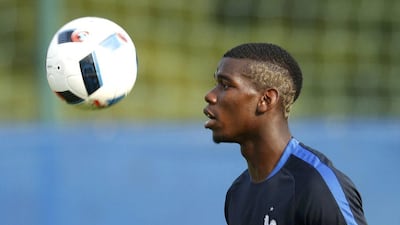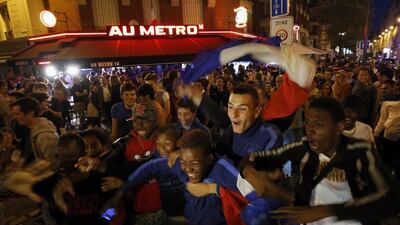PARIS // A revolutionary spirit is alive in France. Some aspects of it have the hosts of Euro 2016 apprehensive of its effects.
Industrial action has put parts of the national transport infrastructure into a state of near paralysis in the weeks leading up to the biggest sporting event the country has staged this century. It is hoped that normal service on the roads and the gas stations can be sustained for the next month.
The France who take the field for the tournament’s opening fixture in Saint-Denis on Friday night against Romania need a bit of revolution, to empower the population to turn away from scepticism and towards affection.
France, champions of their continent and of the world a generation ago, have been losing constituents, and the love of their compatriots at a dispiriting rate for much of the new millennium. The nation, let alone the national sport, longs for something to arrest that decline.
They need a France who are not just also-rans, last-eight finishers — or worse — when they spend concentrated time in the company of elite football countries. They need a set of French players who set inspiring examples.
They are coached by a man who knows intimately the dynamics required to put the brilliance back into France.
Didier Deschamps was France captain when they won the World Cup just north of Paris 18 years ago, and again when they won their last European championship in 2000.
More from Euro 2016:
• Euro 2016 section: All the latest news, interviews, features, information, and much more in one place
• The National debate: France, Spain, Germany, or a new name? Debating which nation will win Euro 2016
• Euro 2016 stadiums: Capacity, fixtures and info on the 10 stadiums hosting Euro 2016 matches
He was an interested, invested observer when decline took hold: a first-round exit as defending champions at the 2002 World Cup; a quarter-final departure at Euro 2004. Then, they may have made the human, common error of hanging on too long to men from the glory years.
More unusual, humiliating errors followed. France’s players went on strike, an angry revolution that was fully, embarrassingly, televised at the World Cup of 2010. Great players, like Thierry Henry and Franck Ribery and 20 others refused to train in protest because a notoriously difficult individual, Nicolas Anelka had been punished for uttering expletives at the then coach, Raymond Domenech.
In 2006, Domenech had coaxed the side to a World Cup final. That was a relative success — France lost to Italy — disfigured when France’s great hero, Zinedine Zidane, was sent off in extra time for head-butting an opponent.
No major national football team has been so magnetically drawn to controversy, ill-discipline, and turmoil as France in the last decade and a half: numerous internal suspensions; Zidane red-carded; even the legendary Michel Platini banned for participating in the sport he graced in the 1980s, infected in his role as football administrator by Fifa scandals.
In Deschamps they look to an icon less tarnished, if never held in the same awe as a Zidane or a Platini.
He has taken some tough decisions. Sometimes caricatured as a cautious manager in the image of his functional, unfussy midfield play as a footballer, Deschamps has had to act the revolutionary in his four-year period in charge of the French team.
His squad for a championship that has long been regarded as France’s most important of this decade registers 10 different names from the party that reached the last eight at the last World Cup. The cuts from that group have sometimes hurt.
There is no Karim Benzema. France are without the centre-forward who, well beyond Real Madrid — for whom he won a second Uefa Champions League title last month — is considered perhaps the most complete No 9 in the game. Benzema has not been selected because of his alleged connections with a blackmail plot against another France international Mathieu Valbuena, a tawdry story that overshadowed the last 10 months of Deschamps’ Euro 2016 preparations.
Benzema's absence angered the player, who comes from an Algerian background. "The coach," he told Marca, "has bowed to racist section of French society."
Valbuena is not in either. Nor is Franck Ribery, another Champions League winner, whose form for Bayern Munich, coming back from a long injury in the last few months suggested that, all things being equal, his blend of experience, invention and trickery would have been a valuable asset.
But Ribery, strongly associated with the 2010 mutiny, won the last of his 81 caps in 2014 and has had his ups and downs in his relationship with the French public.
“There will always be those who have something to say about players’ behaviour,” said Deschamps, guardedly, last week.
There is no Rafael Varane, Lassana Diarra or Mathieu Debuchy, three defensive players trusted by the coach, all injured. Liverpool’s Mahmadou Sakho, though eligible for selection, was banned by Uefa for the tail-end of the season for a doping offence (the player says he mistakenly took a weight-control medication) and left out of France’s 23.
That is six outfield players who had a claim to be in France’s strongest XI. That six spots that the likes of Adil Rami, N’Golo Kante, perhaps Dimtri Payet need to fill with distinction, and to make the recognised stars like Paul Pogba and Antoine Griezmann feel they have the best accomplices around them.
Yet far from a sense of crisis, there is a palpable confidence oozing from the squad. Deschamps told L'Equipe, the French newspaper, "we have had some setbacks on the way."
But he detects a French population ready to fall back in love with the national team, as they did in 1998, when over a million people took to the streets of Paris in the hours after Zidane had scored two goals in a 3-0 World Cup final win over Brazil, and Deschamps himself had accepted the trophy.
He yearns for something similar in July 2016. He knows a positive night against Romania is an important first date in bringing France and their countrymen into closer allegiance.
Follow us on Twitter @NatSportUAE
Like us on Facebook at facebook.com/TheNationalSport




